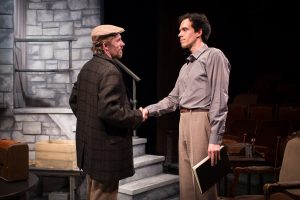
“I’m sick of reading the newspaper. I’m tired of problems.” How many times have we heard those thoughts in recent years? In 1939, Robert Ardrey wrote those lines in his stimulating play, Thunder Rock. Hitler and Mussolini are in power. It is a time of dictators and police states. “What’s next?” his characters wonder. “How is everything going to come out?” We ask those same questions today.
Thunder Rock is a fictional remote lighthouse in Lake Michigan located fifty miles from landfall. David Charleston (a very fine Jed Peterson) lives a solitary existence there. Once per month, his personal friend Streeter (Jamahl Garrison-Lowe) pilots the plane which brings an Inspector (Kelly Dean Cooper) and supplies. On this late afternoon day in August during the last summer before the Second World War, a radio is included in the delivery.
“Why would I want to be in touch?” asks Charleston. He’s an ex-journalist who covered the Spanish Civil War. This lighthouse gig is an escape from civilization. Streeter has come to tell his friend that he is moving headfirst into taking a better job in China. He’ll be flying planes for them in the war against Japan. He wants Charleston to join him and be a gunner. “Why get involved?” he remarks. In one of a long list of memorable lines, Mr. Ardrey writes, “society’s got no worse enemy than a cynic.”
Charleston has decided to create a more hopeful world in his head. There is a plaque in the lighthouse noting a nearby shipwreck from 1849. This lighthouse was dedicated to the sailing ship Land O’ Lakes. All hands were lost including sixty immigrants. Charleston ‘s retreat from humanity is a committed one. “I want a decent world to live in even if I have to make it up.”
The first act of this play is interesting and establishes the structure of the next two acts. The acting is unfortunately uneven in the early going but that is easily remedied by a beautifully cast ensemble when the second act explodes wide open. When this play takes off, it soars with huge themes as big as the fate of mankind itself.
This fascinating meditation makes us consider progress and remission, forward-thinking and retreat. How does 1849 look to someone in 1939? I loved the additional layer of considering this work from the perspective of our current surreal and seismically unstable world in 2020.
As usual, the small theatrical space at the Metropolitan Playhouse has been nicely designed (sets, lighting, costumes and sound) to evoke the lighthouse and these people. Simple directorial decisions by the company’s Artistic Director Alex Roe firmly establish remoteness, both physically and mentally. This production is immensely enjoyable and thought provoking.
In addition to Mr. Peterson’s central performance, there are many wonderful characterizations brought to life on this stage. David Murray Jaffe could hardly be more ideal in his portrait of Captain Joshua Stuart. The device Mr. Ardrey uses to conjure his dialogue with Charleston seems as if it might have been wholly original at the time it was written.
As the Kurtz family, Howard Pinhasik, Susanna Frazer and Hannah Sharafian nail their complicated immigrant story with heart, realism and, ultimately, hope. Teresa Kelsey doesn’t simply portray Miss Kirby. Instead, she completely embodies the woman’s individual existence while simultaneously representing her gender in the middle of great societal changes in 1939. As Cassidy, Thomas Vorsteg reminds us that Charleston’s plight is not unique.
Thunder Rock considers how soon or how long it will take for the human race to cease the cycle of wars and hardships. The cry for leadership is still strong eighty years later after this play’s first production. In his pointed ruminations on that topic, Robert Ardrey warns us all to look inward to find the answers as we do not know from who or when they will materialize. Sooner is better than later which is preferable to never. A speck of optimism is, therefore, better than none at all.
Thunder Rock is being performed at the Metropolitan Playhouse through February 9. 2020.
Bonus Fact: Thunder Rock was a 1947 Radio Play
CBS Radio was trying to figure out how to compete with the two top rated shows at the time, Fibber & Molly and Bob Hope, on Tuesday evenings. They landed on a sixty minute dramatic series. Thunder Rock was one of the works chosen to be rewritten and condensed for broadcast. For radio buffs and the curious, here is a link to a site where you can go back in time when television was in its infancy. As rewritten, the story looks back eight years to 1939 from the later perspective of David Charleston.
